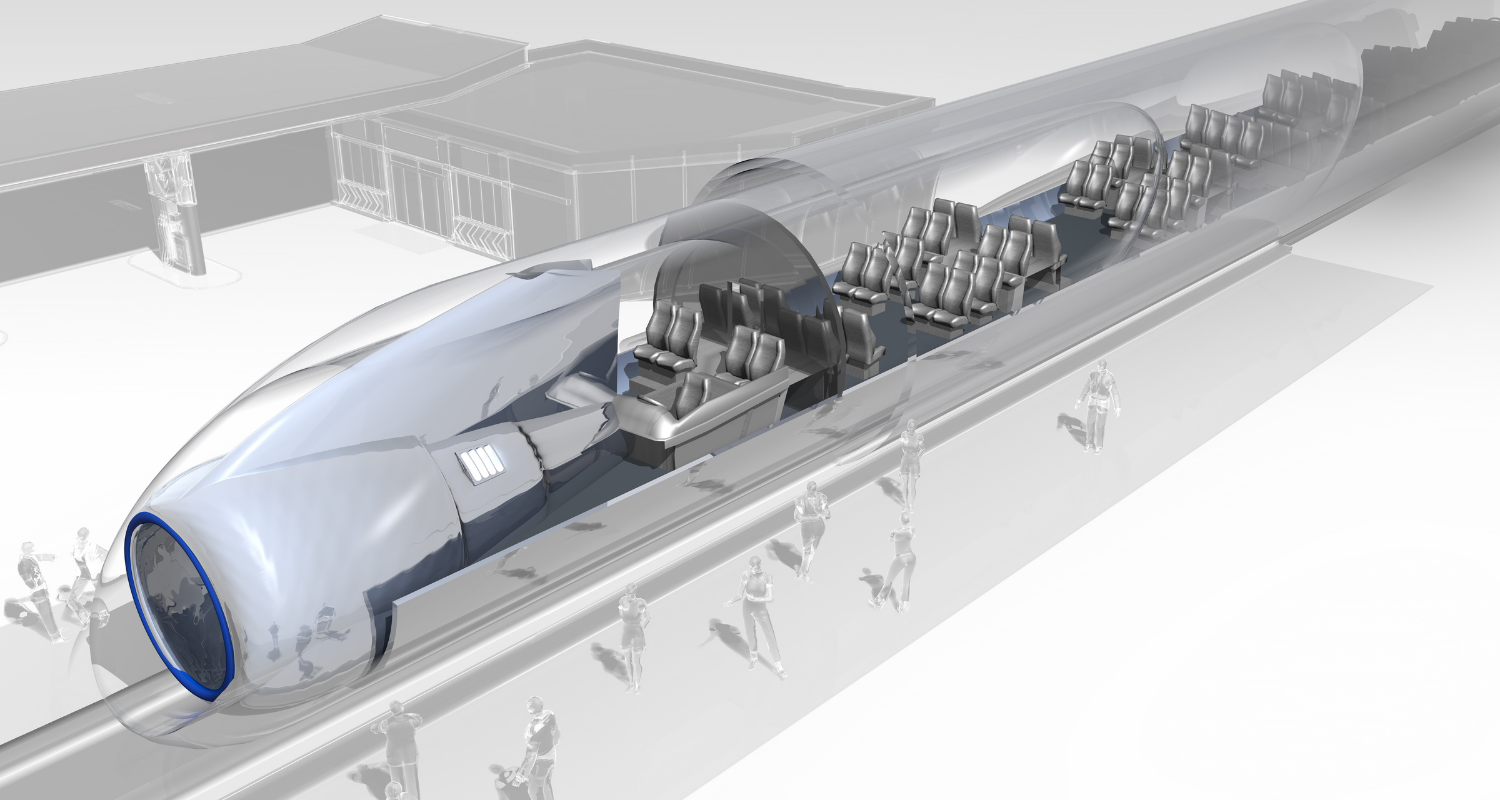
Season 3, Post 27: Take a trip on the hyperloop
Imagine being able to get from central London to Edinburgh in less than an hour, or from downtown New York to San Francisco in fewer than five. Think of all that extra time you would save. Travelling the former route by train currently takes close on four hours, while, a coast-to-coast US trip might require double that. It’s not possible today but could be potentially before the decade-end. We recently spent some time with Josh Giegel, CEO and Co-Founder of Virgin Hyperloop to hear about this evolving vision of future transport.
Virgin Hyperloop’s website contains a nifty calculator that allows you to see the theoretical reduction in journey times between any two major cities using their hyperloop systems. The term was first coined by Elon Musk in 2013 as a proposed mode of passenger and freight transport. Pods travel via magnetic levitation through a network of sealed, low air pressure tubes in an environment almost totally free of resistance or friction. Josh describes it as “fully electric autonomous system,” or “a smart car in a dumb tube.” Using proprietary technology (Virgin has 200+ patents or applications), speeds of up to 1000km/hour can potentially be reached, equivalent to over ten times those achieved on conventional rail or three times faster than high-speed rail.
Beyond speed, the logic for such systems is compelling. They are inherently safer than current modes of transport since they are fully autonomous (and so free from the possibility of human error) and are also not subject to exogenous factors such as weather or traffic. In Virgin’s vision, pods would be summoned on-demand. Further, the hyperloop system is energy agnostic and so can be powered by potentially any green source including wind, solar or hydrogen. Josh believes that what Virgin is building is “a sustainable mass transportation system.”
How realistic is this vision? Virgin has performed over 500 small-scale trials to-date and believes that commercial services might be possible before the end of this decade, notwithstanding the high costs of building the infrastructure. Even with such notionally high speeds, there is apparently no need for passengers to wear harnesses and there has been no evidence to-date of motion sickness. Initial services are likely to be short distance (for example, from a city centre to an airport), with the much longer-term intention being to link distant cities. Beyond the fact that Virgin is an investor in this venture, what is perhaps more telling is that DP World, the Emirati port and logistics business, is the largest shareholder. The potential for more efficient freight transportation via hyperloop is evident. Another handful of private companies are also developing projects at present. Watch this space. Your author certainly can’t wait to take his first trip.
Interested readers may also wish to watch this short video summary on the topic, courtesy of Bloomberg.
6 July 2021
The above does not constitute investment advice and is the sole opinion of the author at the time of publication. Past performance is no guide to future performance and the value of investments and income from them can fall as well as rise.
Alex Gunz, Fund Manager
Disclaimers
The document is provided for information purposes only and does not constitute investment advice or any recommendation to buy, or sell or otherwise transact in any investments. The document is not intended to be construed as investment research. The contents of this document are based upon sources of information which Heptagon Capital LLP believes to be reliable. However, except to the extent required by applicable law or regulations, no guarantee, warranty or representation (express or implied) is given as to the accuracy or completeness of this document or its contents and, Heptagon Capital LLP, its affiliate companies and its members, officers, employees, agents and advisors do not accept any liability or responsibility in respect of the information or any views expressed herein. Opinions expressed whether in general or in both on the performance of individual investments and in a wider economic context represent the views of the contributor at the time of preparation. Where this document provides forward-looking statements which are based on relevant reports, current opinions, expectations and projections, actual results could differ materially from those anticipated in such statements. All opinions and estimates included in the document are subject to change without notice and Heptagon Capital LLP is under no obligation to update or revise information contained in the document. Furthermore, Heptagon Capital LLP disclaims any liability for any loss, damage, costs or expenses (including direct, indirect, special and consequential) howsoever arising which any person may suffer or incur as a result of viewing or utilising any information included in this document.
The document is protected by copyright. The use of any trademarks and logos displayed in the document without Heptagon Capital LLP’s prior written consent is strictly prohibited. Information in the document must not be published or redistributed without Heptagon Capital LLP’s prior written consent.
Heptagon Capital LLP, 63 Brook Street, Mayfair, London W1K 4HS
tel +44 20 7070 1800
email [email protected]
Partnership No: OC307355 Registered in England and Wales Authorised & Regulated by the Financial Conduct Authority
Heptagon Capital Limited is licenced to conduct investment services by the Malta Financial Services Authority.



